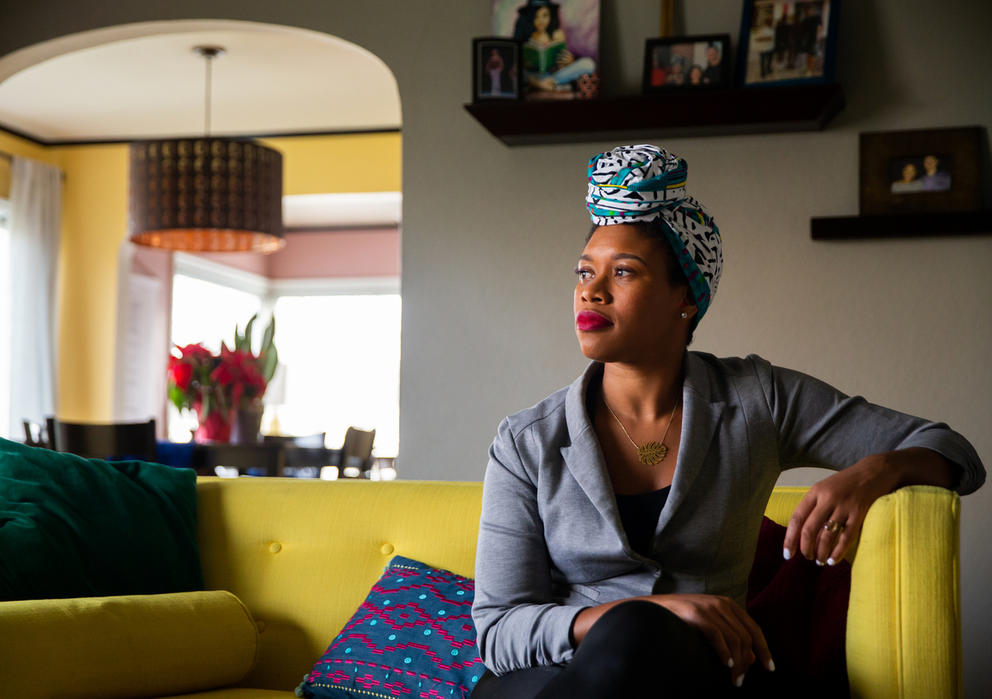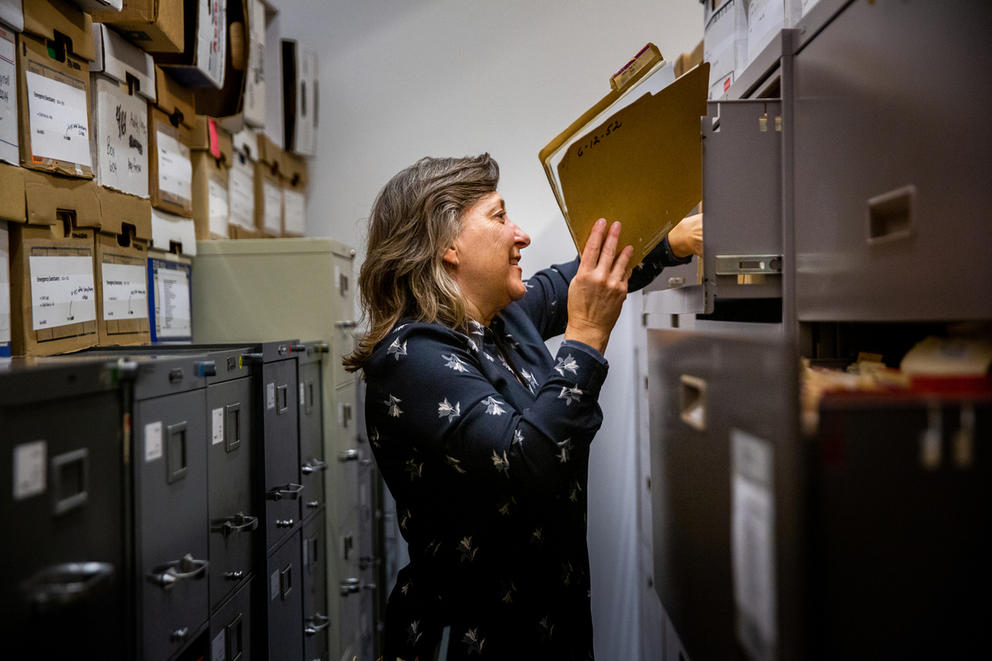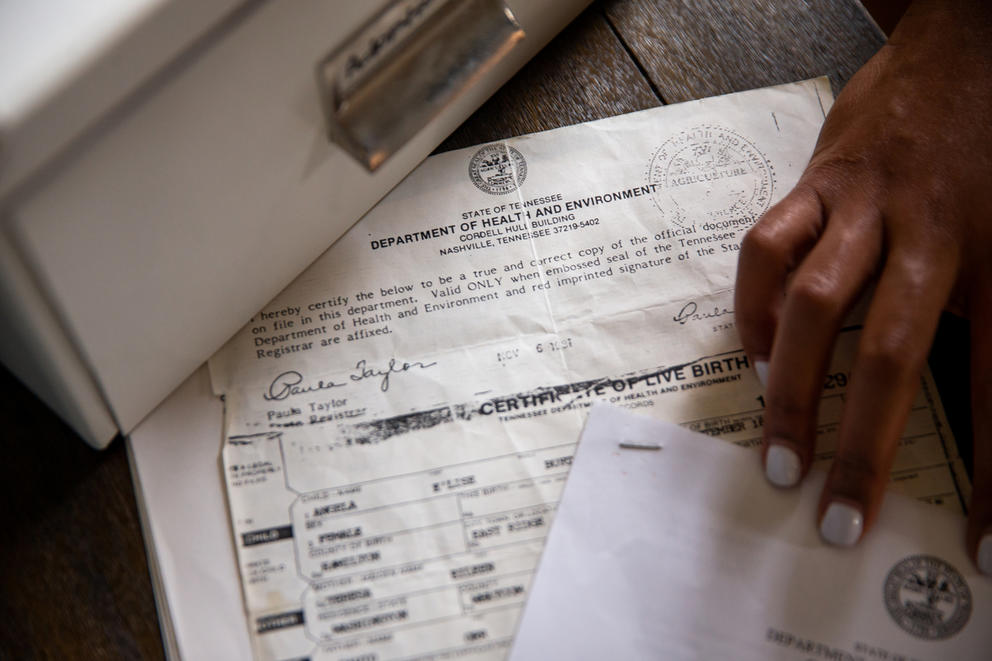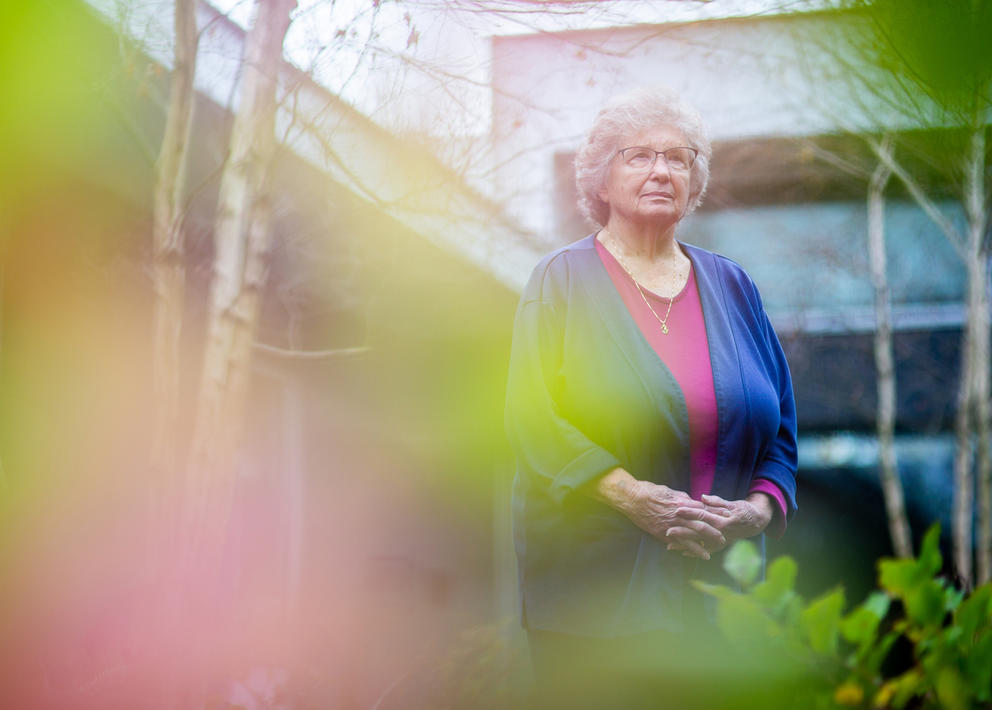To account for these oversights and to begin addressing any possible harm, a group of volunteer auditors at the nonprofit formerly known as Medina, now called Amara, is combing through the paperwork from 50 years of adoptions finalized between 1950 and 2000.
Whose questions were never answered? Who should be told what and when and how? In some cases, will the pain of knowing outweigh the pain of not knowing? Clues lie within 3,400 fraying manila folders.
This story was originally published by The Imprint, a national news outlet covering child welfare and youth justice issues.
“This is intergenerational trauma,” said Angela Tucker, an adoptee and former Amara manager who launched the inquiry. “If we don’t tell this 75-year-old their story, it trickles down and impacts his kids, and his kids’ kids.”
In an effort dubbed the Adoption Files Initiative, Amara seeks to make amends in cases where requests were dropped, or staff chose to withhold information that should have been shared. Since 2018, auditors at the agency have uncovered hundreds of requests from adults who were adopted as children, birth parents and adoptive couples who sought information about their children's history, heritage or kin.
The initiative appears to be an unprecedented effort, according to more than a dozen adoption experts, nonprofit leaders and advocates familiar with national issues in the field.
Rena Konomis, Amara’s post-adoption program manager, who currently runs the file review, said it was once common practice to withhold the identities and circumstances of adoptions; at the time, the failure of the agency’s staff to respond to such inquiries was not considered negligence. Employees generally did not know how to handle the truth-seeking queries.
Still, Konomis added: “It was definitely something they could have done better.”
Revisiting this past is a weighty, emotionally exhausting task. Several volunteers said in interviews they can stomach only one four-hour session per week.
“It led to me bleeding emotionally because I felt the pain,” said Tucker, an author, public speaker and advocate. “This kind of information can be life-changing.”
Subtle, yet vital
There is no authoritative count of those who’ve been adopted in America, but a frequently cited figure estimates there are more than 7 million people who were adopted. That means tens of millions more have felt the impact as an adoptive or biological parent, sibling or relative.
The greatest surge in U.S. adoptions took place following World War II, with unwed mothers pressured by family, religion and societal norms to give up their babies — a process then steeped in secrecy. Policymakers and private adoption agencies insisted on confidentiality, with state after state passing laws to permanently seal adopted children’s original birth records.
Now, DNA testing, laws allowing limited release of nonidentifying medical information or “open” adoptions are often the norm — with all parties in communication.
But throughout the 1960s, 1970s and 1980s, there was little chance of accessing any information through adoption agencies or government vital records.
While some may never seek answers to their history, executives of large adoption agencies interviewed by The Imprint said they receive hundreds of new requests for information each year. Throughout the COVID-19 pandemic, there has been a noticeable uptick, with many Americans using the quiet time of lockdowns to contemplate their pasts.
Agency leaders said they try to fulfill all nonidentifying information requests or mutual requests for a reunion. But, citing decades-old secrecy laws, they say they are typically barred from disclosing identifying details, such as names and addresses. None believed it was feasible to proactively review old files for unfulfilled requests.
At Amara, managers are trying to pry open a small portal into their agency’s role in a vast and shrouded past — before the opportunity to help people and families heal is lost forever.
The impacts so far have been small and large.
In 2019, staff finally delivered the ring a birth mother had asked the agency to pass on when her adopted daughter turned 16.
That daughter is now 68.
“So subtle and yet so vital,” she told a local television station, pressing the ring she wore as a necklace against her chest. “I suppose it’s kind of like being born again.”
Mining a half-century of secrets
The amends-making process at Amara starts with file auditors poring through 1- to 3-inch-thick folders. The two-dozen trained volunteers have a range of professional backgrounds, from accounting to social work. They are graduate students and retirees. Many have personal ties to adoption. All must sign confidentiality agreements and undergo background checks.
Pages from the 1950s and ’60s are the thinnest sheets they come across, but the judgments in those texts are perhaps the heaviest.
Project manager Konomis said adoptive fathers were at times referred to as “a strong business gentleman,” and notes about their wives said things like “I don’t know why she keeps wearing that dress, it looks horrible on her.” Comments on birth families were “just as unvarnished,” she added, at times including negative comments on a birth mother’s demeanor, appearance or intelligence.
Konomis, who is an adoptive mother and former corporate project manager, took over the Adoption Files Initiative in 2019 from Tucker, who remains on the ethics advisory board.
Konomis said while the agency hasn’t tracked race, ethnicity and other demographic information, the adoptions being examined were typical of the times: middle-class families from across Washington state, working in professions from academia to the aerospace industry. The adoptions were almost entirely private exchanges of custody, with biological parents relinquishing children without being compelled to do so because of abuse or neglect allegations.
Konomis estimates two-thirds of the roughly 1,200 cases examined so far involve white adoptees. The rest mostly involved Black children, with a smaller number identified as being of Native American, Asian or Latino descent.
In at least 20% of cases examined to date, auditors have found something that needed amending, she said, such as letters from birth mothers that were never delivered.
Of those, many wanted to find and reunite with relatives. But nearly half simply sought nonidentifying information, such as medical history or birth details. In each case, the organization had no dedicated staff or process to provide the requested information, they deemed the information confidential, or they provided little more than a form letter with a list of sliding-scale fees — discouraging further inquiry.
Each folder being examined includes the adoptive family’s case history, medical records, marriage licenses, adoption decrees and other legal documents, with time stamps on the outside marking each child involved. Social workers’ notes describe the adoptive parents, including interview transcripts and detailed descriptions of their homes. The sections about birth families tend to be slimmer. Some files include photographs, drawings and other small mementos that birth parents had asked, fruitlessly, to be passed along.
Still, each parent and adopted person has their own unique set of questions, issues and quandaries about the material that has long been tucked away. Konomis flags more complex cases for a 12-member ethics advisory committee, which meets monthly and includes social workers, therapists and other experts with ties to adoption. They consider questions ranging from how to approach someone who hasn’t heard from the agency since 1976 to the rare cases involving children born of rape or incest.
Not all families want or need cinematic reunions, and a small number haven’t even responded to Amara’s initial amends letter offering information that have been sent since March 2019. Some are disturbed about their past, others simply curious.
“Some of us had a community and culture that’s been completely wiped away,” said Rufina Beem Holcombe, a Seattle-area small business owner and adoptee who now volunteers for Amara’s ethics committee. “Giving someone the chance to know some of that story, whether or not they are ever going to meet that family, is the most important part of this.”
One adoptee had spent a lifetime curious about her lifelong love of horses. Through the Adoption Files Initiative, she learned that in 1956, her birth mother described herself to social workers as a “horse woman” who worked at a barn and wanted to become a veterinarian.
The adopted woman with the scarred arms responded to Amara’s offer last year. She has yet to confirm whether she would like to receive her preadoption medical history.
Collectively, the files in the locked archive tell a story of beauty, pain, heartache and love, volunteers reviewing the files said in interviews.
“Our role is being like a fine-mesh filter. We read every single page and look for things that are off, or wrong, or that can be corrected,” said Katrien Schellekens, 53, a former tax consultant and mother of two. “I feel a big responsibility to do a very thorough job.”
There’s one mother Schellekens simply can’t forget for the sheer determination in her case. A Black woman had fled the Deep South to give birth in Seattle, where she hoped her baby would land in a more tolerant and more affluent community.
“Before the internet and cellphones, she must have done research — I don’t know how — to determine Seattle was the best place for her baby,” Schellekens said. “That’s amazing.”
'We walked away with nothing'
One of Amara’s ethics advisers, Carole VandenBos, is acutely aware of adoptions’ troubled legacy of secrets because of her own past.
In an interview, the 84-year-old described the only sex education she received growing up was her mother telling her to be a “good girl.”
So in 1957, when she fell “head over heels” in love with her then-boyfriend and the couple conceived, she felt she had to place her son for adoption, she said, “so as not to bring shame to my family.”
Instead, she was left with emptiness and regret. Like many women at the time, VandenBos received no birth certificate nor any other proof of the child she had given up: “We walked away with nothing. They said goodbye. You relinquished that child,” she said. “Then it’s, ‘We don’t want to talk to you again. Case closed.’ ”
Official recording of live births and parentage in the U.S. began in the early 20th century. But the new government record presented a new issue for those times: how to hide evidence on birth certificates that the mothers were unwed and the births were, in the terminology of the times, “illegitimate.”
By 1941, roughly half of U.S. states required adoption court records to be sealed to the public, according to historian E. Wayne Carp’s Family Matters: Secrecy and Disclosure in the History of Adoption. Seven years later, nearly every state had laws authorizing the issuance of new, amended birth certificates for adoptees — documents that included only the names of adoptive parents.
Few of these laws explicitly required those records to be sealed — or required adoption agencies to maintain secrecy — from the families involved in the adoption. But after World War II, many agencies nonetheless chose to do so, Carp wrote, practices eventually backed by state legislatures.
Deep suffering resulted from the secrecy. A book published this year by the journalist Gabrielle Glaser, American Baby: A Mother, a Child, and the Shadow History of Adoption describes how some unwed pregnant women faced coercion, deceit and inadequate medical care at “maternity homes,” where they were sent while pregnant and birthing. Others remained at home with parents, but constrained by sexism and repressive notions of sexuality, they were pressured into thinking adoption was their only path. Heartbreaking separations ensued, leaving behind lifelong trauma and longing.
VandenBos reconnected with her son once he reached adulthood, a reunion that came about after her own search. She said she was one of the first birth mothers granted contact by a judge with her child, who had been adopted, in a process relying on a third party as a “confidential intermediary.”
“Being cut off from a child you carried for nine months is a tragedy,” she said, and those wounds don’t easily heal.
But VandenBos has used her experience to help others. Over 39 years, during off-hours from her job in logistics at Boeing and then full-time as a retiree, she has conducted family searches for as many as 4,000 adopted people and birth relatives, she said, helping connect people as far away as Dubai. For years, she also led the Washington Adoption Reunion Movement, a group that pioneered the use of intermediaries.
Meanwhile, all around VandenBos, a nationwide drive had emerged to end the secrecy of adoption. The Adoptees’ Liberty Movement Association, Concerned United Birthparents, the American Adoption Congress and the more recent Bastard Nation have fought for laws to reopen birth records. They argued that adoptees have a right to know their histories or birth parents the right to know their children.
Opposition has been formidable. For years, the Catholic Church and groups representing adoptive parents and adoption agencies vehemently defended secrecy they say birth mothers want and need. And even as that institutional resistance faded, and some states created avenues for families to connect, many secrecy laws and court rulings remain entrenched, comprehensive and detailed in their restrictions.
The Minnesota-based Adoptee Rights Law Center reports that just 10 states now allow adopted people “unrestricted” access to their nonamended, preadoption birth certificates. Twenty-three states have “compromised” laws that allow redacted or otherwise limited access. And an additional 18 states do not allow those who’ve been adopted to view the records — unless they have court orders that are notoriously difficult to obtain.
A 1984 state law has sheltered adoption agency records in Washington state. The law provides exceptions for nonidentifying information and for confidential intermediary services. But its terms are otherwise steadfast: “All records of any proceeding under this chapter shall be sealed and shall not be thereafter open to inspection by any person except upon order of the court for good cause shown.”
'The feeling of being unable to know'
In 2017, Tucker — then working at Amara as director of its post-adoption support program — received a phone call that launched what would become the Adoption Files Initiative: an adult who said throughout her life she’d called every decade in search of her biological parents.
Tucker dug up the folder. Thirteen years prior, the woman’s mother had signed a release waiving confidentiality. Suddenly, there was the chance of a reunion.
That hope quickly faded. Her mother had passed away in 2006.
The loss of this once-in-a-lifetime opportunity struck Tucker profoundly. Ten years earlier, Tucker — a Black woman raised by white parents in Seattle — had set out to meet her birth family in Tennessee, with her husband and his video camera in tow. The power of that reunion became a moving 2013 documentary, Closure.
Following the film’s release, Tucker told the publication Seattle’s Child that knowing where she came from gave her “a sense of wholeness.”
“I used to harbor a feeling of injustice,” she said, “that feeling of being unable to know something that is mine to know.”
In an interview with The Imprint last month, Tucker said birth parents don’t often know they can call adoption agencies and ask to see parts of their files. And the questions that accumulate over the course of a life can also feel unanswerable.
“I wanted seemingly insignificant details about her,” Tucker said of her mother. “Was her grass mowed or dying, was her house brick or wood? Knowing those facts have helped me feel more complete, and that’s something adoption agency leadership would not understand.”
So Tucker puzzled over the thousands of other dormant adoption files in Amara’s storage closet. She spent over a year building a team of advisers and a process before the Adoption Files Initiative reached its current volunteer-driven form.
Since leaving the agency, she is now mentoring nearly 100 others, and working on a book about adoption for Beacon Press.
Still, persuading other agencies to replicate the Adoption Files Initiative proved more challenging than expected. The social workers who maintained the secrecy in decades past are often now running the very same adoption agencies, Tucker said, and see little need for a change. They maintain that promises of secrecy made to birth mothers decades ago must be kept.
In interviews, representatives of agencies in Texas, Illinois and New York that collectively hold tens of thousands of adoption files dating back more than a century said they have had full-time staff fulfilling requests from adopted people and their families for at least 20 years. But none had looked through dated files for prior unfulfilled requests.
Three agency leaders praised Amara’s efforts. But they remained skeptical about being able to replicate the effort due to lack of resources or the restrictions of state laws.
“Anything an agency can do to further meet the needs or requests of their clients, that’s good, and we’re always trying to do that,” said Heidi Bruegel Cox, executive vice president and general counsel of the Texas-based Gladney Center for Adoption. The center has conducted roughly 23,000 adoptions since the 1880s, and now supports legislation granting access to birth certificates that remains stalled in the Texas Legislature. Five staff members review new information requests from families.
But she added: “Am I going to go back 50 or 100 years to see what someone woulda, shoulda, coulda done? I can’t imagine doing that.”
VandenBos said when Amara initially invited her to participate, she wondered how the historic information would land. Yet she knew the effort was vital.
“It’s very hard to go in with a project like this going back 20, 30, 40, 50, 60 years, and contacting somebody,” she said. “But it’s long overdue.”
This story was originally published by The Imprint, a national news outlet covering child welfare and youth justice issues.







